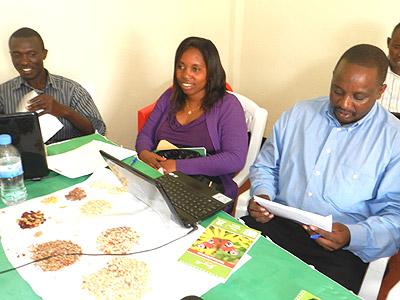East Africa Grain Council (EAGC) will soon start supporting Rwandan farmers in post harvest management.


East Africa Grain Council (EAGC) will soon start supporting Rwandan farmers in post harvest management.This was disclosed by Samuel Ruto, Programs Manager of EAGC, while addressing agriculture officers from various districts across the country in Kayonza yesterday.EAGC and the agronomists spent two days training on structured trading systems and post harvest management methods.The training was organised by EAGC in conjunction with Rwanda Rural Rehabilitation Initiative (RWARRI).Ruto said increase in maize production meant more earnings for farmers trading in the commodity, adding that maize was the potential staple food in the region."The efforts are meant to protect millions of maize grains harvested every year. The surveys show quality of grain loss is between 30 per cent-40 per cent...actually three out of ten bags of maize, are lost through post harvest in the region,” he said.Ruto explained that agronomists were regarded as trainers of farmers across communities, adding that they needed to conceptualize the structure of trading systems.He added that agronomists would disseminate the rules of trade based on standards in the market, further noting that there was need to harmonise trade in the region."Farmers need trade contracts, available grain standards and emerging market institutions. Farmers are not aware of markets or don’t have access to market information, can’t preserve quality of grains, etc."We want to equip all farmers with skills necessary to preserve grain quality...harmonising quality standards to check trade barriers and promote trade across the region is the goal.”Nathalie Niyonagira, one of the trainees and an Agriculture officer in Kirehe district said EGAC input was timely.She said that despite the relentless efforts to handle post harvest challenges there was still a long way to go.Niyonagira said that assistance from EAGC to farmers to establish warehouses in rural areas is great news."Warehouses are only in urban areas, yet a farmer would be comfortable with a warehouse near his or her farm,” she said.






